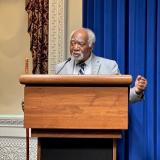Media
Latest News
CONGRESSMAN DAVIS REMEMBERS 9/11, CALLS FOR RENEWED COMMITMENT TO UNITY, ACCOUNTABILITY, AND PROGRESS
CHICAGO, IL — Today marks the 24th anniversary of the September 11, 2001, terrorist attacks, a day that forever changed America. We mourn the lives lost, honor the bravery of first responders, and recommit ourselves to the ideals that define our nation.
Chicago, IL – Today, Congressman Danny K. Davis (IL-07), joined by state and local officials, community leaders, and residents, held a press conference demanding the immediate release of FEMA disaster relief funds to support families across Chicago still reeling from devastating flooding.Congressman Davis emphasized that while federal dollars have been appropriated, too many residents have yet to see relief. “Release the money now,” Davis declared. |
Statement of Representative Danny K. Davis
In Opposition of the Big, Bad, Inhumane, and Ugly Republican Bill - July 3, 2025
Congressman Danny K. Davis Condemns Unilateral Military Threats, Urges Diplomacy Over War in U.S.–Iran Relations
Go ahead once again, President Trump has overstepped his bounds and is acting like a king, dictator, or something worse. Without any interaction or discussion with Congress, he has attacked congressional intelligence. Anything else. Yeah, like the song said, WAR, what is it good for? Absolutely nothing but to kill. Mean, mainly, disrupt and destroy.
Chicago Members of Congress Denied Entry to ICE Processing Center in Broadview, IL
Testimony of Congressman Danny K. Davis (As Prepared)
In Support of His Amendments to Reimburse Working Parents Up to $8,000 for Child Care,
Legislation Continues a Legacy of Justice Reform and Community Investment Originating from Davis' Landmark 2008 Law




